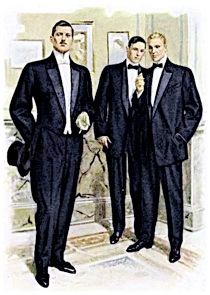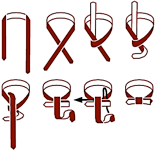For One Night Only
(A Tragedy)
I met him in a crowd;
As if with care 'twas weighted,
His shapely back was bowed,
His brow was corrugated.
I asked him, "Why so pale?
What grief your soul has cankered?"
And gleaned his painful tale
Over a friendly tankard.
"Once," the said wight began,
"I knew not what the blues meant,
I was a genial man,
And never shirked amusement.
I shot, I rode, I rinked,
I trod the mazy measure,
My life, to be succinct,
Was one long round of pleasure.
"In those delightful days
I do not mind confessing
That, if I had a craze,
It was for faultless dressing.
One night- it serves to show
How labor omnia vincit –
I tied a perfect bow;
I've not been happy since it.
"I worked with watchful eye,
With fingers swift but wary,
It seemed a decent tie,
But not extraordinary.
But when at length I gazed,
To put the final clip in,
I staggered back amazed,
Ejaculating 'Rippin'!"
"Oh, had I but the pen
That serves the inspired poet,
I'd try to picture then,
With proper force and glow, it.
The billowy waves of white,
The folds, the spick-and-span knot;
Were I a bard, I might –
But as it is, I cannot.
"Suffice it to observe
That on minute inspection
It showed in every curve
The hall-mark of perfection.
The sort of tie which you
When wrapped in sweetest sleep oc-
casionally view;
A tie to mark an epoch.
"That night no peer I owned,
I carried all before me.
Society" – he moaned –
"United to adore me.
Whenever I passed by,
Men stopped their conversation,
Drank in that Perfect Tie
In silent adoration.
"Since then the striking feat
(Such dreams the ambitious male lure)
I've striven to repeat
Result: completest failure.
Though toiling, as I say,
As much as blood and flesh'll,
The bows I tie to-day
Are good, but nothing special.
"So now my fellow man
I shun, no matter who 'tis.
As far as mortal can,
I cut my social duties.
I seldom eat or rest,
I'm gloomy, haggard, mirthless.
To one who's known the best,
All other things are worthless."
First published in Punch, June 10, 1903.




